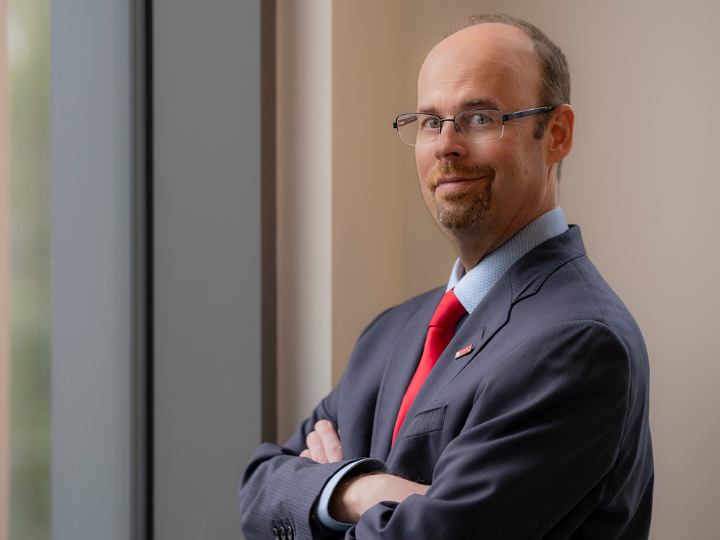
The University of Houston has welcomed Dr. Jonathan McCullers as its new vice president of health affairs and the second dean of the Tilman J. Fertitta Family College of Medicine.
McCullers succeeds Dr. Stephen Spann, Fertitta College of Medicine’s founding dean, who retired in August after four decades in medicine, including the last eight at UH.
“It is a tremendous honor to be selected as the second dean of the Fertitta College of Medicine,” McCullers says. “Dr. Spann did such an amazing job shepherding the College through its first four years, and I am eager to take the torch and run with it.”
McCullers joins UH from the University of Tennessee Health Sciences Center College of Medicine where he was the senior executive dean of clinical affairs and chief operating officer from 2019. In his role there, he provided oversight of all clinical affairs for the university across Tennessee and was the main liaison to more than a dozen affiliated health systems throughout the state.
McCullers also served as the chair of pediatrics for Le Bonheur Children’s Hospital in Memphis, helping transform it from a regional community hospital into a comprehensive academic medical center.
“I look forward to leading the great team that has been established as we train the next generation of physicians, deliver outstanding, personalized clinical care, conduct groundbreaking research in collaboration with other colleges at UH and serve our local community,” McCullers says.
A native of Virginia, McCullers earned his medical degree from the University of Alabama at Birmingham where he also completed his internship and residency.
Dr. McCullers shares more about his vision for the College in the following Q&A:
Q: What drew you to the University of Houston and the Fertitta College of Medicine?
A: I was attracted by the community-facing mission of the College and the fact that is a new College with significant opportunities to grow.
Q: What is your vision for the college in the next 5-10 years?
A: We plan to expand our class size from 60 currently to 120 per year so we can train more doctors to serve across Texas. We plan to grow our clinical presence so we can care for more individuals in our community. And we plan to develop new research that focuses on improving the delivery of quality care at a great value.
Q: How will you further the college’s mission of improving health and health care outcomes in underserved communities?
A: By growing and expanding in all four of our mission areas: educating more doctors, expanding relevant research, growing our clinical footprint through a Federally Qualified Health Center model and continuing to engage with the communities we serve, meeting them on their own terms.
Q: How will you innovate or improve the curriculum and integrate emerging technologies like digital health and AI to better prepare our future health care leaders?
A: We’re already starting with an advantage regarding innovation – our curriculum gets students out into the real world sooner than others and it incorporates concepts of prevention, wellness, population health and an understanding of the social determinants of health. We will start to better leverage AI through the use of things like digital avatars of our professors and other solutions that will improve diagnosis and treatment.
Q: What are your priorities for advancing faculty research and expanding partnerships with health care entities outside of UH?
A: We have a clear need and priority to better partner with health care systems in the region to provide sites and preceptors to train our students. Along with these relationships comes the opportunity to do research in a collaborative model where both the health systems and the communities they serve are engaged. This is a major focus of my efforts at present.
Q: What are you most proud of in your career so far?
A: Generally, my work improving the lives of members of the community in the areas that I have served. The most specific example was helping lead the City of Memphis through the COVID crisis and maintaining a focus on health equity so that marginalized communities did not fall behind.
Q: What is the most important piece of advice for students seeking a career in medicine today?
A: Go into Medicine with an open mind and don't be afraid to dream big. Medicine is a great field with unlimited opportunities for anyone with the drive to succeed.
Q: What do you see as the most pressing health care issues today and how will the Fertitta College of Medicine help address them?
A: Medicine is too costly and too unevenly distributed. We need to innovate to deliver higher quality care in an equitable manner at a lower cost. The College of Medicine was founded on this principle and this Mission resonates strongly with me.